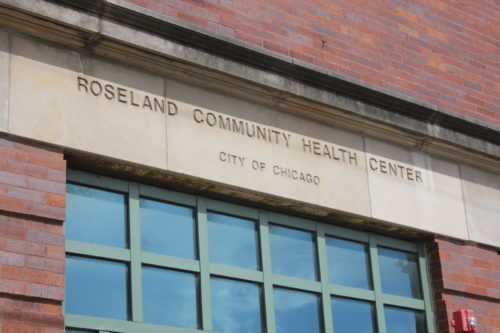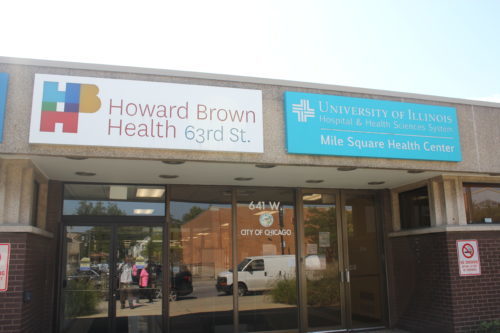
If you live on the South Side and get infected with a sexually transmitted disease such as Chlamydia or Gonorrhea don’t expect much help from the Chicago Department of Public Health (CDPH).
That’s because the city closed its Specialty Clinic in Englewood on Jan. 12, 2018, and reduced hours at its other South Side clinic in Roseland from five days a week during its peak during the 1990s to two days a week. Last year, the department suffered a $2.5 million cut in federal funding which resulted in the Englewood clinic closing, according to CDPH officials. The city operates two other Specialty Clinics that provide free STD testing and treatment, one in Lakeview on the North Side, and the other in Austin on the Far West Side.
But regardless why services have been eliminated and reduced at the city’s health clinics South Side residents seeking free STD treatment may run into barriers when seeking medical assistance, as was the case for one Englewood man.
For the first-time in his life 46-year-old George, who declined to give his last name, said he was treated this month for Chlamydia.
“I never experienced anything like this before because I was married up until last year, when I got divorced,” explained George. “So, it was not until I got there that I found out the (Englewood) clinic had closed.”
And rather than receive treatment from the UI Health Mile Square Health Center at 641 W. 63rd St., which also provides free STD treatment, George went to John H. Stroger Hospital of Cook County on the Near West Side two weeks later after he first tried the Roseland clinic.
He said he was not familiar enough with the Mile Square Center, which opened July 2012, and heard patients must pay for services if they do not have health insurance.
“Again, all this is new to me, so I’m not familiar with how these clinics run. When I went to the Roseland clinic it was closed. A sign on the door stated it’s open on Mondays and Thursdays only and it was Wednesday when I went there,” he recalled.
The city currently receives a $9.3 million federal grant from the Integrated HIV Surveillance and Prevention Programs for Health Departments, and $1.2 million is used to operate the Specialty Clinics, said Elena Ivanova, a spokeswoman for the CDPH.
And even though George travelled from the South Side to the West Side for treatment, one community activist questioned whether young adults would do the same.
“George is an older individual, who sounds mature, so he knew what needed to be done,” said Nadia Butterfield, a longtime Englewood resident and retired nurse practitioner. “But when it comes to young folks like 20- to 25-years-old, their maturity level is not high, they usually don’t know where to get help with problems outside their neighborhood, and frankly speaking, a lot of young folks are downright ignorant when it comes to handling something like a STD.”
The 2018 HIV/STI Surveillance Report by the CDPH supports Butterfield’s assertion that young adults make up the bulk of STD cases in Chicago.
According to the report, adults between 20- and 29-years-old accounted for 16,410 of the 30,292 new Chlamydia cases reported in the Chicago area for 2017. Blacks also accounted for the majority of Gonorrhea and Syphilis cases reported that same year, the last year data was available. And currently, Chicago neighborhoods with the highest STD rates, according to the report, are North Lawndale and Washington Park with Chlamydia; Uptown, Washington Park and North Lawndale with Gonorrhea; and Edgewater, Uptown and Lakeview with Syphilis.
Employees at the Roseland clinic, who asked to remain anonymous, said the CDPH had been working toward reducing costs at the health clinics for years. In December 2011, the Mile Square Center was awarded a contract by the city “to provide comprehensive primary care services at the Englewood clinic,” said Henry Taylor, chief executive officer of UI Health Mile Square Health Center. He added that since opening the clinic almost 2,000 patients have been seen for a STD. Ivanova acknowledged that more patients are treated for STDs at the Englewood Mile Square Clinic than when the city operated a clinic there.
The clinical director at the Mile Square Center in Englewood said patients could schedule an appointment to be tested and treated for a STD or can simply walk in.
“The Englewood clinic is open Monday through Friday from 9 a.m. to 5 p.m. and we will treat anyone regardless if they don’t have insurance or if they cannot pay our $25 sliding fee,” said Dr. Ashish Ansal. “And we are not limited to seeing a specific number of patients daily, so we provide service to anyone who comes through our doors.”
When the city operated its Englewood clinic budget constraints limited treatment to no more than 16 patients daily, as is the case today at its three current clinics.
Taylor added that despite the clinic losing money there are no limitations on services.
“Englewood is budgeted for $1.9 million in revenue and operates at a loss of $56,000,” said Taylor. “Our mission is to serve the underserved and be in communities that need us the most.”




